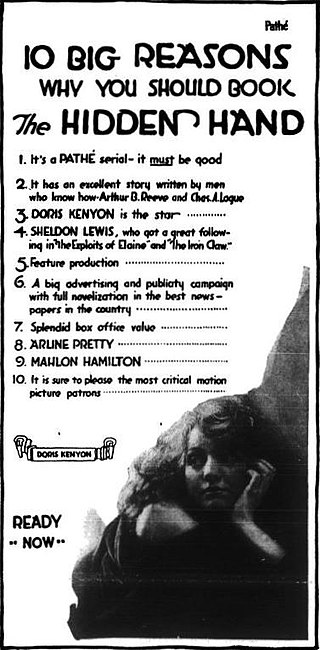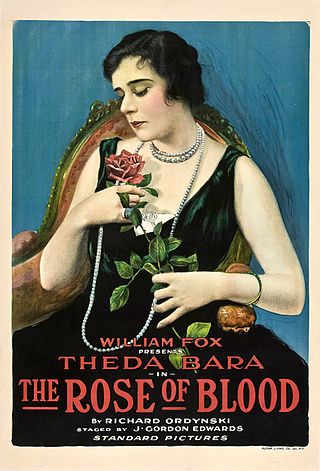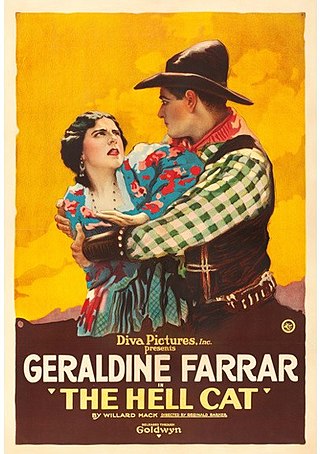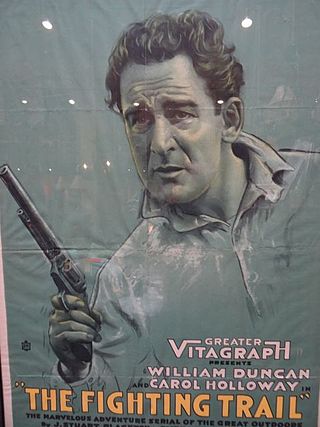
Rubye De Remer was an American actress and showgirl known for her appearance in the "Ziegfeld Midnight Frolic" and over twenty films.

Old Wives for New is a 1918 American silent drama film directed by Cecil B. DeMille. It is based on the 1908 novel of the same title by David Graham Phillips.

The Mystery Ship is a 1917 American adventure film serial directed by Harry Harvey and Henry MacRae. The film is considered to be lost.

The Bull's Eye is a 1917 American film serial directed by James W. Horne. It is now considered to be a lost film.

The Hidden Hand is a 1917 American film serial directed by James Vincent. This is a lost serial.

The Seven Pearls is a 1917 American silent action film serial directed by Louis J. Gasnier and Donald MacKenzie. Fragments are held by the Library of Congress.

The House of Hate is a 1918 American film serial directed by George B. Seitz, produced when many early film studios in America's first motion picture industry were based in Fort Lee, New Jersey.

The Rose of Blood is a 1917 American silent drama film directed by J. Gordon Edwards and starring Theda Bara. Based on the story "The Red Rose" by Ryszard Ordynski, the film was written by Bernard McConville. The Rose of Blood is now considered to be a lost film.

When a Woman Sins is a 1918 American silent drama film directed by J. Gordon Edwards and starring Theda Bara.

The Secret of the Storm Country was a 1917 American silent drama film directed by Charles Miller and starring Norma Talmadge. The film is described as not a direct sequel but a "continuation" of the 1914 film Tess of the Storm Country, starring Mary Pickford. The film is now considered lost.

The Auction Block is a 1926 American silent comedy film directed by Hobart Henley. The film stars Charles Ray and Eleanor Boardman. It is written by Fanny and Frederic Hatton and is based on the novel of the same name by Rex Beach.
The Man From Montana is a 1917 silent black and white film directed by George Marshall. It stars Neal Hart and George Berrell. It is not known whether the film currently survives, which suggests that it is a lost film. The film should not be confused with the 1941 film Man from Montana.

Barbary Sheep is a 1917 American silent drama film produced by Famous Players–Lasky and distributed through Artcraft Pictures, an affiliate of Paramount Pictures. The film was directed by Maurice Tourneur and stars Elsie Ferguson in her motion picture debut. This picture is said to have George M. Cohan in his film debut as well. It is an adaptation of the 1907 novel Barbary Sheep by British writer Robert Hichens. It was thought to be a lost film until an 8-minute clip or fragment was found in the Gosfilmfond archive.

The Serpent's Tooth is a 1917 American silent drama film starring Gail Kane from the stage and released through the Mutual Film company. It is a lost film.

The Love That Lives is a 1917 American silent drama film produced by Famous Players Film Company and distributed through Paramount Pictures. The film stars Pauline Frederick and was directed by Robert G. Vignola. The film is based on the story "Flames of Sacrifice", by Scudder Middleton.
The Bride's Awakening is a 1918 American silent drama film released by Universal Pictures and produced by their Bluebird production unit. Robert Z. Leonard directed the film and his then-wife Mae Murray was the star. A print of the film is housed at the EYE Institute Nederlands.

The Hell Cat is a 1918 American silent Western film produced and distributed by Goldwyn Pictures. Reginald Barker directed and Geraldine Farrar starred. It is not known whether the film currently survives.

The Hungry Heart is a 1917 American silent drama film directed by Robert G. Vignola and written by Charles Maigne based upon the novel of the same name by David Graham Phillips. The film stars Pauline Frederick, Howard Hall, Robert Cain, Helen Lindroth, and Eldean Steuart. The film was released on November 5, 1917, by Paramount Pictures. It is not known whether the film currently survives, and it may be a lost film.

Love Letters is a 1917 American silent drama film directed by Roy William Neill and written by Ella Stuart Carson and Shannon Fife. The film stars Dorothy Dalton, William Conklin, Dorcas Matthews, Thurston Hall, Hayward Mack, and William Hoffman. The film was released on December 24, 1917, by Paramount Pictures. A print of Love Letters is held by the Library of Congress.

The Fighting Trail is a lost 1917 American silent Western serial film directed by and starring William Duncan. It was produced and distributed by the Vitagraph Company of America. It was released in 15 chapters.



















